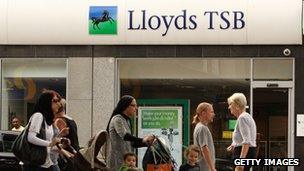Lloyds 'knew about' black hole in Co-op Bank's accounts
- Published

Lloyds now plans to float 631 branches on the stock market
The bosses of Lloyds Banking Group have told MPs that they knew there was a black hole in the accounts of the Co-operative Bank, four months before a vital deal with them collapsed.
The Co-op had been due to buy 631 Lloyds branches, which is around 5% of the UK's banking network.
The deal fell through in April 2013.
The development came as ratings agency Moody's put more pressure on the Co-op Bank by downgrading both its debt and deposit ratings.
Moody's said its new rating reflected the "high likelihood of default" on its debt despite the bank's £1.5bn recapitalisation plan.
The agency said it remained uncertain whether the bank would achieve the recapitalisation it had forecast, and said the "significant" restructuring required contained "execution risks."
Co-op finance fears
Earlier, the chairman and chief executive of Lloyds both told MPs that they had doubts about the Co-op bank's finances in December 2012.
"We had doubts at that time about their capability to execute this plan," said António Horta-Osório, the chief executive of the Lloyds Banking Group.
"It was clear to us, that there was a shortfall of capital," he told MPs on the Treasury Select Committee.
Lloyds was ordered to sell the branches by the European Commission. The sale was a condition of the government's bail-out for the bank, which is 38% owned by the tax-payer.
The plan to sell them is known as Project Verde.
The Co-op Bank became the preferred bidder to buy the Lloyds branches in December 2011.
But the full extent of the Co-op Bank's problems only became public knowledge on June 17th 2013, when it announced plans to raise £1.5bn in extra capital.
Mr Horta-Osório explained that they had asked the Co-op about their financial problems in December 2012.
"Their answer was, 'we are handling this. We are revising the plan, together with the regulator, to resolve this situation.'"
He was then asked whether he was reassured by that answer.
"We were re-assured, but we were not totally reassured," he replied.
Tax-payer value
Earlier Mr Horta-Osório and the Lloyds chairman, Sir Winfried Bischoff, defended their decision to try and sell the branches to the Co-op, rather than the rival bidder, NBNK.
"The Co-op had a brand name, it had an established bank, it had staff, and it had a rating. NBNK had none of those," said Sir Winfried.
In any case, he argued, NBNK's offer of £700m was, in effect, lower than that being made by the Co-op.
Both men were asked about a warning from NBNK, made in January 2012, that the Co-op deal was "fraught with risk", and that it was unlikely to be able to finance the deal.
Sir Winfried Bischoff said he wasn't certain that the board had seen that warning, but insisted that they had always acted in the best interest of shareholders.
Plan B
Mr Horta-Osório said the costs of unwinding the 631 branches from Lloyds was £1.6bn.
The bank's plan B, to float the branches under the former TSB brand, would cost an extra £200m to £300m.
But he insisted that tax-payers would not lose out.
"The costs of an Initial Public Offering (IPO) will be recovered for tax-payers," he said.
A spokesman for Lloyds Banking group said the bank was now planning an IPO sometime in 2014.
Since the EU imposed a deadline for selling the branches for November 2013, Lloyds is now talking to the European Commission about extending that deadline.
- Published17 June 2013
- Published24 April 2013
- Published13 June 2013